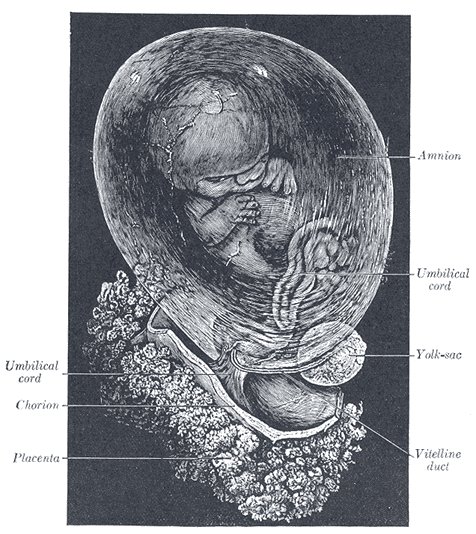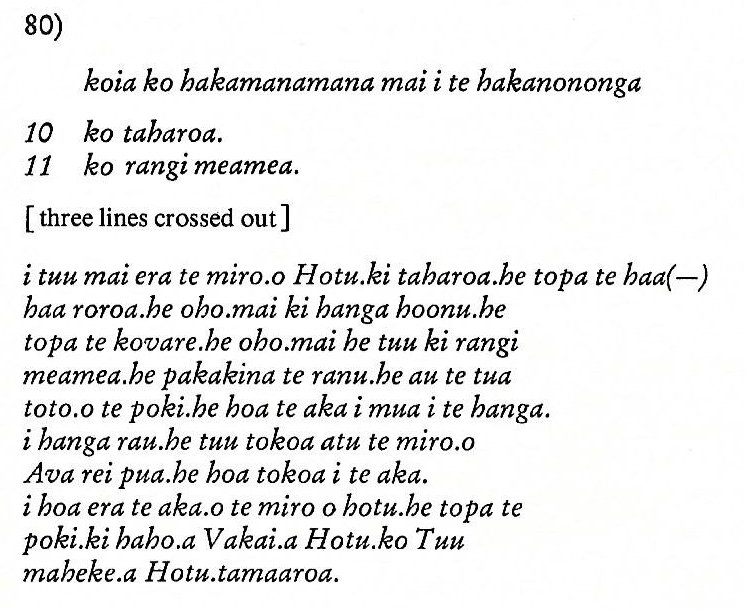
|
E:77 |
|
he ui a Ira.heaha.te
ua.ka rapu mai era.he ki mai |
Ira asked [he ui a
Ira], 'Why [heaha]
did they send signals?' |
|
he kī a Ira.kia
Raparenga.ka rapu koe.ka hakamaa.pe(-) |
Ira said [he
kī a Ira] to
Raparenga, 'Give signals [ka rapu koe] and
tell this [ka hakamaa.penei]: If the canoe
continues [ana oho.te miro] to the right side
[a te rara mata'u] (of Easter Island, seen
from Motu Nui), they should sail way out [a haho
ana ana oho] because of Tama, an evil fish with
very long nose [he ika kino.he ihu roroa]
(this is a wordplay with the place name on the
southeastern shore, which 'demands bad victims
because of his cliffs').' |
|
nei ē.ana oho.te miro a
te rara matau.a haho ana |
|
ana oho.ko tama he ika
kino.he
ihu roroa.he rapu. |
| Kino.
1. Bad; kikino, very bad, cursed; kona
kino, dangerous place. 2. blemish (on body).
Kinoga, badness, evil, wickedness; penis.
Kinokino, badly made, crude: ahu kinokino,
badly made ahu, with coarse, ill-fitting stones.
Vanaga. 1. Bad, wrong. T Pau.: kiro, bad,
miserable. Mgv.: kino, to sin, to do evil.
Mq.: ino, bad, abominable, indecent. Ta.:
ino, iino, bad, evil; kinoga (kino
1) sin; Mgv.: kinoga, sin, vice. 2. A skin
eruption, verruga, blotched skin, cracked feet T.
Churchill.
Ihu. 1. Nose; ihu more, snub nose,
snub-nosed person. 2. Ihuihu cape, reef;
ihuihu - many reefs, dangerous for boats. 3.
Ihu moko, to die out (a family of which remains
only one male without sons); koro hakamao te mate
o te mahigo, he-toe e-tahi tagata nó, ina aana
hakaara, koîa te me'e e-kî-nei: ku-moko-á te ihu o
te mahigo, when the members of family have died
and there remains only one man who has no offspring,
we say: ku-moko-á te ihu o te mahigo. To
disappear (of a tradition, a custom), me'e ihu
moko o te tagata o te kaiga nei, he êi, the
êi is a custom no longer in use among the people
of this island. 4. Eldest child; first-born; term
used alone or in conjunction with atariki.
Vanaga. 1. Nose, snout, cape T (iju G). Po
ihuihu, prow of a canoe. P Pau.: ihu,
nose. Mgv.: ihu, nose; mataihu, cape,
promontory. Mq., Ta.: ihu, nose, beak,
bowsprit. Ihupagaha, ihupiro, to rap
on the nose, to snuffle. 2. Mgv.: One who dives
deep. Ta.: ihu, to dive. Churchill. Sa.:
isu, nose, snout, bill. Fu., Fakaafo, Aniwa,
Manahiki: isu, the nose. Nuguria; kaisu,
id. Fotuna: eisu, id. Moiki: ishu, id.
To., Niuē, Uvea, Ma.,
Ta., Ha., Mq., Mgv., Pau., Rapanui, Tongareva,
Nukuoro: ihu,
id. Rarotonga: putaiu,
id. Vaté: tus,
id. Viti: uthu,
nose. Rotumā: isu,
id. ... usu
and ngusu
... serve as transition forms, usu
pointing to
isu the nose in
Polynesia and ngusu
to ngutu
the mouth, which is very near, nearer yet when we
bear in mind that ngutu
the mouth is snout as well and that isu
the nose is snout too ... Churchill 2.
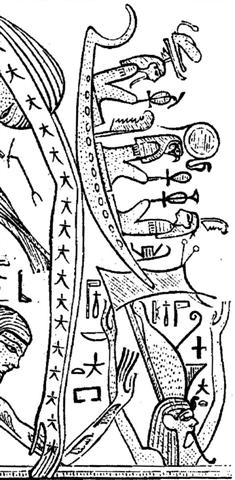
... string games could be
resumed after it was clear that the Sun had managed
to leave the horizon and was rapidly gaining in
altitude: 'Before the sun starts to leave the
horizon ... when it shows only on the horizon, ...
then string games were no longer allowed as they
might lacerate the sun. Once the sun had started to
go higher and could be seen in its entirety, string
games could be resumed, if one so wished. So the
restriction on playing string games was only
applicable during the period between the sun's
return and its rising fully above the horizon
...
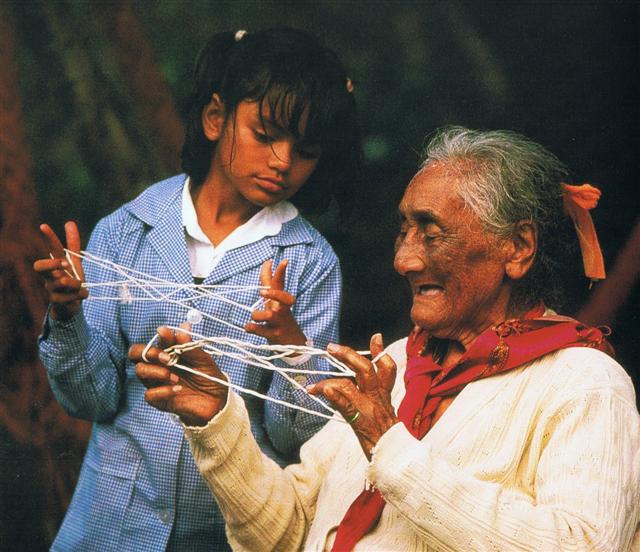 |
|
he rapu.he rapu.he
tikea e runga e te miro. |
He waved,
waved, waved [?], and waved. The one on board the
boat saw [he tikea e runga e te miro]
Raparenga's waving [te rapunga.o Raparenga]
and understood. The signals arrived [he angiangi]
on board the canoe [he iri mai te rapu o runga i
te miro]; the waving arrived below [he topa
ki raro.te rapu] (i.e.. in the west). [(Here
they) died out, he oti.] |
|
te rapunga.o
Raparenga.he angiangi.he iri mai te rapu |
|
o runga i te miro.he
topa ki raro.te rapu.he oti. |
| (crossed out: he ki
a Hotu) |
he ki a Hotu |
| |
The two hulls were no
longer kept lashed together (i.e., they were
separated for the rest of the journey). |
|
Oti. To come
to an end; to suffice, to be enough: ku-oti-á,
it is finished; ina kai oti mo kai, there
is not enough to eat; he-oti á, there isn't
anymore left, it's the last one; it's enough with
that. Vanaga. Ta.: 1. Oti, presage of death.
Sa.: oti, to die. 2. To cut. Mq.: koti,
oti, id. Sa.: 'oti, id. Ma.: koti,
id. Churchill.
The nakshatra system works with a pair - the Sun
on one side and the Full Moon (Hotu) on the
other. In the night the Full Moon can be observed
where the Sun is not. When late after midnight the
Full Moon has reached the horizon in the west (ki
raro) it implies the Sun is on its way up in the
east. |
|
he rangi a Hotu.ki te
miro o te ariki tamahahine. |
Hotu
called out [he rangi] to the canoe of the
queen [te aríki tamahahine]:
'Steer the canoe to the left side [a te rara
maúi] when you sail in. Teke will jump over on
board (your) canoe to work his mana [hakamanamana]
when you sail [mo oho.atu] through the
fishing grounds [i te hakanononga]!'
[I will go (koau ma oho) to the right (a
te rara mata'u), working mana (mo
hakamanamana) when going through the fishing
grounds (mo oho atu i te hakanononga).]
Teke jumped on board the second [he teki.a
Teke.ki runga ki te rua] canoe, (that) of the
queen.
The king's canoe [te miro o te ariki. tamaaroa]
sailed to the right, the queen's [to te ariki.
tamahahine] to the left. |
|
a te rara maui.tou miro
ana oho.koe.ko Teke.mo |
|
teki atu.ki runga ki
tou miro ena. mo |
|
ka hakamanama- |
|
na mo oho.atu i te
hakanononga.koau ma oho. |
|
a te rara matau.mo
hakamanamana mo oho. |
|
atu i te hakanononga.he
teki.a Teke.ki runga ki te rua |
|
E:78 → Rigel (Foot) &
Capella (Mother Goat) |
|
miro. o te ariki.
tamahahine. |
|
he oho. te miro o te
ariki. tamaaroa.a te
rara matau |
|
he oho, to te ariki.
tamahahine a te rara
maui |
| Matua
tamaroa, father; matua tamaahine, mother.
Ha. 1. Four. 2. To breathe. Hakaha'a,
to flay, to skin. Vanaga. 1. Four. P
Mgv., Mq., Ta.: ha, id. 2. To yawn, to gape.
3. To heat. 4. Hakaha, to skin, to flay;
unahi hakaha, to scale fish. Mgv.: akaha,
to take to pieces, to take off the bark or skin, to
strip the leaves off sugarcane. 5. Mgv: ha,
sacred, prohibited. Mq.: a, a sacred spot.
Sa.: sa, id. Churchill.
Roha.
Mgv.: roha, the corner of a house. Mq.:
oha, koha, a transverse joist to brace
the rafters. Ha.: loha, the trimming of the
corners and ridges of a house. Churchill.
Ua uhi 'ia kō lāua mau mana'o i ke aloha,
their thoughts were overwhelmed with love. |
|
Counting from Rigel and Capella
(*78) to Zosma and Coxa (*169) we will find a
quarter of a year. The separation of the pair of
hulls occured at different stars depending on where
the precession (the Fox) had moved the Sun.
|
JULY 4
(184) |
Zosma &
Coxa |
|
June
7 (158) |
Rigel &
Capella |
|
184
+ 16 - 158 = 42 → Bharani |
|
|
a Hanga.i hakamanamana
i te hakanononga. |
Honga [surely it ought
to be Hanga] worked his mana in the fishing grounds. |
Haga.
1. Bay, fishing spot.
(Figuratively) he haga o te ákuáku, it is the
[evil] spirit's fishing spot, i.e. a place where
they hide waiting for people to fall under their
power. 2. To want, to love. Ku haga á i te vai,
I want water, I am thirsty. Vanaga. 1. Bay, strait,
anchorage, strand, beach. P Mq.: hana,
haka, small bay, creek, cove. 2. Work, labor,
employment, act, affair, creation, design, state,
maker, fashion, manufacture, occupation, profession;
to do, to make, to construct, to employ, to form, to
manufacture, to fashion, to found, to be busy with;
haga rakerake, crime; tagata haga ei mea,
mercenary; haga no iti, to plot mischief;
haga ke, to act contrary; haga takataka,
to disjoin; haga nui, difficulty, fatigue, to
weary; tuhi ki te haga, to give employment;
haga hakahou, to make over, to renew,
recovery; haga koroiti, to deal prudently;
haga nuinui ke, to overburden. P Pau.: haga,
to do, action, work, a deed. Mgv.: haga,
aga, work, labor. Mq.: hana, haka,
action, act, work, occupation. Ta.: haa,
work, to labor, to make. 3. Agreement, conduct,
liking, intention, desire, will; to resolve, to
permit, to endeavor, to tolerate, to be willing, to
wish, to approve; haga ihoiho, fixed desire;
haga mai, haga no mai, to agree, to
hearken favorably; tae haga, despite,
involuntary, to refuse, to renounce; noho
hakahaga, apathy. 4. = haka. Pau.:
haga = haka. 5. Mgv.: haga, a
fish. Mq.: haka, id. 6. Mgv.: haga, a
fishtrap. Sa.: faga, a fish-trap, bird-cage.
Ma.: hanganoa, a small basket for cooked
fish. 7. Mgv.: haga, a measure of a fathom.
Ta.: aa, to measure length. Mq.: aka,
ana, to measure with the arms. Ma.: whanga,
id. Churchill. Hagaava (haga 1 -
ava 2), entrance of a harbor. Hagahaga:
1. (haga 2), work. 2. hesitation, to
hesitate. Churchill.
288 + 26 = 314, and at the time
of rongorongo this was 41 right ascension days
later, viz. at the solstice:
|
OCT 16 |
17 (290) |
18
(*211) |
 |
 |
 |
|
Ga8-6 |
Ga8-7 (210) |
Ga8-8 |
|
Winnowing Basket-7 (Leopard)
18h (273.4)
*273.4 - *41.4 = *232.0
NASH (Point) = γ Sagittarii
(273.7),
θ
Arae (273.8) |
ZHŌNGSHĀN =
ο
Herculis
(274.0), π Pavonis (274.6) |
ι Pavonis (275.1),
POLIS = μ Sagittarii
(275.9)
MENKAR
(α Ceti)
|
|
Dec 19
(*273 = 364 * ¾) |
20 (354 = 12 * 29½) |
SOLSTICE |

... As has already been mentioned,
the Delphians worshipped Dionysus
once a year as the new-born child,
Liknites, 'the Child in the
Harvest Basket', which was a
shovel-shaped basket of rush and
osier used as a harvest basket, a
cradle, a manger, and a
winnowing-fan for tossing the grain
up into the air against the wind, to
separate it from the chaff. The
worship of the Divine Child was
established in Minoan Crete, its
most famous early home in Europe. In
1903, on the site of the temple of
Dictaean Zeues - the Zeus who was
yearly born in Rhea's cave at Dicte
near Cnossos, where Pythagoras spent
'thrice nine hallowed days' [27] of
his initiation - was found a Greek
hymn which seems to preserve the
original Minoan formula in which the
gypsum-powdered, sword-dancing
Curetes, or tutors, saluted the
Child at his birthday feast. In it
he is hailed as 'the Cronian one'
who comes yearly to Dicte mounted on
a sow and escorted by a
spirit-throng, and begged for peace
and plenty as a reward for their
joyful leaps ... |
|
°Dec 15 (*269) |
16 (350) |
17 |
|
'Nov 22 (*246) |
23 |
24 (328) |
|
"Nov 8 (*232) |
9 |
10 (314) |
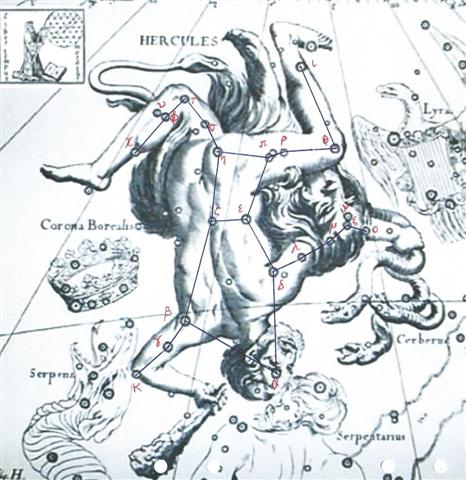 |
Whereas 288 ("October 15) + 78 =
366 ("January 1) = 314 + 2 * 26.
'One never knows what one treads underfoot' →
Rigel (*78, the Foot of Orion)
→ *62 (Beid) + *16.
|
Counting the
tresses of
Pachamama (the
World Mother)
from right to
left: |
|
1 |
26 |
78 |
1 |
29 |
90 |
|
2 |
26 |
2 |
30 |
|
3 |
26 |
3 |
31 |
|
4 |
25 |
104 |
4 |
34 |
124 |
|
5 |
26 |
5 |
31 |
|
6 |
27 |
6 |
30 |
|
7 |
26 |
7 |
29 |
|
Total = 396 =
182 + 214 (= 2 *
91 + 2 * 16) |
|
The key number
78 (= 3 * 26)
equals 288 - 210
(and also 185 -
107). |
|
July 29 |
Oct 15 |
Jan 1 |
|
210 |
288 |
366 |
|
420 / 2 |
210 + 78 |
210 + 156 |
|
URSA MAJOR |
35 |
HERCULES |
211
|
ERIDANUS |
|
ο (*127 + *183 = *310) |
ο (*274) |
Beid (*62) |
|
310 + 80 = 390 |
274 + 80 = 354 =
390 - 36 |
62 + 80 = 142 =
390 - 148 |
|
July 26 (207 = 390 - 183) |
146 |
Dec 20 (354) |
May 22 (142 = 354 - 212) |
|
"June 15 (166) |
"Nov 9 (313 = 354 - 41) |
"April 11 (101 = 142 - 41) |
|
18 * 29½
= 166 + 365 = 531 |
678 = 313 + 365 = 300 + 378 |
466 = 101 + 365 =
531 - 65 |
|
 |
 |
152 |
 |
|
Ga3-4
(63) |
Ga8-7 (210) |
Gb5-10 (363) |
|
7-MACAW |
300 = 62 + 365 - 127 |
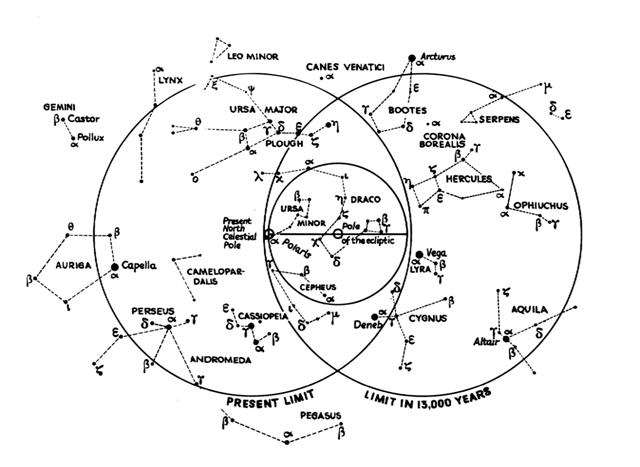
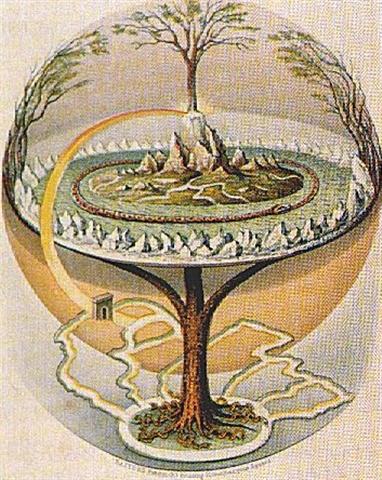
|
|
1 ko
te hina. |
a
Hotu. a Honga. |
|
2 ko
te kana haure. |
|
3 ko
koekoe. |
|
4 ko
tuu. |
|
5 ko
mahatua. |
|
|
a Teke.i hakamanamana.i
te hakanononga.o te rara maui. |
Teke worked his mana in
the fishing grounds to the left side. |
|
1 ko
piro. |
a
Hotu. a Teke. |
|
2 ko
pura. |
|
3 ko
hatehate. |
|
4 ko
uto. |
|
5 ko
mata o hotu. |
|
|
E:79 → northern
spring equinox
... Ecclesiastically, the equinox
is reckoned to be on 21 March (even though the
equinox occurs, astronomically speaking, on 20 March
in most years) ... |
|
6 ko
pungaehu. |
a
Hotu. a Teke. |
|
7 ko
hatu. |
|
8 ko
piu. |
|
9 ko
hau ngutu. |
|
| he ui mai te tangata
o runga i te miro.o te ariki tama(-) |
The men on
board [o runga] the royal canoe looked out [he
ui] from Varinga Te Toremo (the northeastern
cape of the Poike peninsula).
There they saw [he tikea] the canoe of the
queen, the canoe of Ava Rei Pua, as it reached [ka
tuu] Papa Te Kena (on the northern shore, east
of Hanga Oteo). |
|
aroa.mai varinga te
toremo.he tikea te miro o te |
| ariki.tamahahine.ka
tuu.atu te miro.o āva. |
|
rei pua.ki papa te
kena.he onga a Honga.a raro |
|
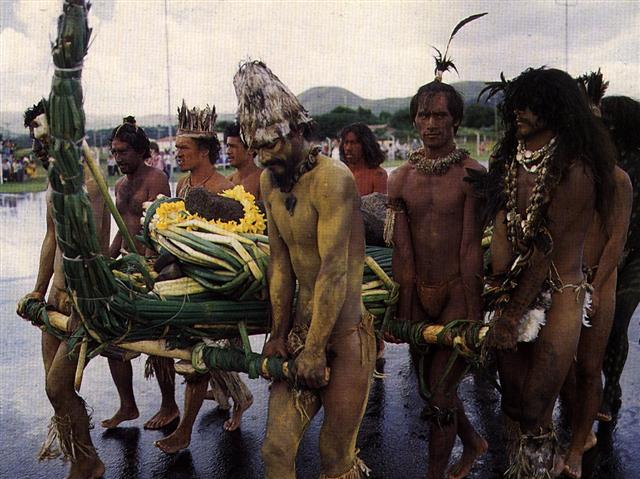
... low down among the other stones in the wall of
Ahu Naunau in Anakena
[they] found
a crowned head broken off at the neck, and clearly
it was from a stone statue which headless earlier
had been brought to Norway. For the Easter Islanders
the immediate response to the new discovery was
La Reina! - it just had to be their ancient
queen Avareipua.
Old
people cried emotionally ... |
| he rangi.ki te ariki
motongi.ko Hotu. |
Honga came
and gazed in the direction below (i.e., toward the
west).
He called out [he rangi] to the noteworthy
ruler (? ariki motongi) Hotu, 'There is the
canoe of the queen! It will be the first one to
land! [he rae ka tomo era]'
At this news King Hotu replied to Honga, 'Recite
(rutu) (powerful incantations) as though the
ten brothers of the chief (ariki maahu) were
one whole(?).'
The ten recited with all their might. [he rutu
atatahi te angahuru]
This is what they recited [penei i rutu ai]:
'Let all movement (? konekone) cease!' [ka
hakamau te konekone].
They recited and sailed on swiftly [he rutu he
oho mai]: Honga, Te Kena, Nuku Kehu, Nga Vavai,
Oti, Tive (corrected for Sive),
Ngehu, Hatu, Tuki, and Pu (corrected for Bu).
|
| ai te miro o te
ariki.tamahahine.he rae ka to(-) |
| mo era.he hakahoki
mai te ariki.a Hotu i te kī. |
| kia Honga.ka
rutu korua
atatahi te angahuru. |
| te ariki
(crossed out: motongi) maahu.he
rutu atatahi te anga(-) |
| huru penei i
rutu ai.ka hakamau te
konekone |
| he
rutu he oho.mai.Ko
Honga.ko Te kena.Ko Nu(-) |
| ku kehu.ko Nga
Vavai.ko Oti.ko Sive (sic!).ko |
|
Ngehu.ko Hatu.ko
Tuki.ko Bu (sic!). |
|
Ko Nuku kehu. |
ko Ngavai. |
ko Oti. |
ko Sive. |
ko Ngehu. |
ko Hatu. |
ko Tuki. |
ko Bu. |
|
| Ata
1. Dawn, first light before sunrise; ku-hamu-á te
ata , dawn has broken; ku-tehe-á te ata,
it's already dawn (lit.: the lights have flown). 2.
Particle inserted between the imperative prefix
ka and the verb to signify 'well, carefully,
intelligently': ka-ata-hakarivariva, prepare
it well. Between the prefix e and kahara
it expresses 'to make sure that, to take good
care that...' : e-ata-kahara koe o oona, be
careful not to get dirty; e-ata-kahara koe o kori
te moa o te tahi pa, be sure not to steal
chickens of another property. 3. More: iti,
small; ata iti, smaller; he-ata-ata
iti-iti ró, the smallest of all. Vanaga. Âta
1. Shadow: he-veveri te poki, ana tikea toona
âta, the child is frightened at seeing his
shadow; person's reflection (in mirror, in water):
he âta oou-á, it's your own reflection. 2. To
be frightened by a shadow: he-âta te îka, the
fish are frightened (and they flee) by people's
shadows. Vanaga. 1. Image, picture, portrait,
design; to draw, to paint (shadow sense). P Mgv:
ata, image, likeness, portrait, shadow of a
human being, form, shape, appearance, imprint,
impression. Mq.: ata, image, statue,
portrait, shadow, surface; to design, to mark. Ta.:
ata, shade, shadow appearance, form,
representation of an object, cloud, cloudy. 2.
Transparency, end of day, sunset (bright sense);
e ata, red clouds; ku ata, transparent;
ata mea, ata tea, ata tehe,
dawn, daybreak, sunrise; ataata, end of day,
sunset. P Mgv.: ata, morning or evening
twilight, daybreak, dawn; ata haihai, evening
twilight, a beautiful sunset; ataiai,
twilight, clouds red with the sunset; atakurakura,
a beautiful sunrise or sunset; atareureu,
dawn, the first peep of day, morning twilight. Mq.:
ata, to appear, to rise, to shine (of stars);
ata uá, morning twilight; ataata,
diaphanous, transparent. Ta.: ata, twilight.
3. A designation of space; ata hakahohonu,
abyss; ata hakaneke mai, nearby, close at
hand; ata tapa, lateral, marginal. 4 ? Ata
kimikimi, to inquire; ata puo, to hill a
plant; ata ui, to examine, to taste.
Churchill. Atahenua (ata 3 - henua
1), landscape, countryside. Atakai: 1.
Generous, hospitable, beneficent, indulgent,
liberal, obliging; prodigality, indulgence; rima
atakai, benevolent, generous, open-handed; gift,
liberality. 2. Calm, unperturbed, grateful.
Churchill. Ata-ta T, evening (? ataata).
Atatehe (ata 2 - tehe 1), dawn;
popohaga atatehe, morning, early in the
morning. Churchill.
Tahi. Other; te tahi tagata someone
else; te tahi hoki... and others again...;
te tahi... te tahi..., some... others; te
tahi atu, the rest of them. Tahitahi, to
scrape with a sharpened stone. Vanaga. One, only,
simple; te tahi, next; e tahi, anyone;
e tahi no, unique, unity; e tahi e tahi,
simultaneous. P Mgv.: Mq., Ta.: tahi, one.
Churchill.
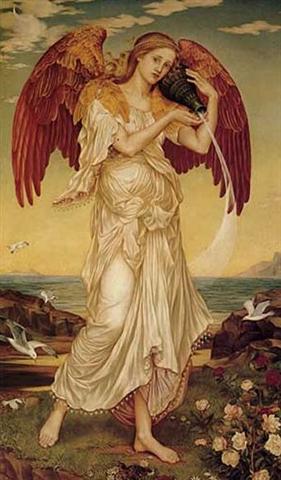 |
|
E:80 |
| koia ko
hakamanamana mai i te hakanononga |
He worked
mana in the fishing grounds. |
|
10 ko
taharoa. |
|
11 ko
rangi
meamea. |
|
| (three
[empty?]
lines crossed out) |
[Similar to
the 3 days between Polaris (*26) and Hamal
(*30).] |
|
...
For three days all household fires remained extinct
as a preparation for the solemn renewal of the fire,
which took place on the fifth or sixth day after the
winter solstice ...
... Väinämöinen set about building a boat, but when
it came to the prow and the stern, he found he
needed three words in his rune that he did not know,
however he sought for them ... |
| i tuu
mai era te miro.o Hotu.ki taharoa.he topa te haa(-) |
When Hotu's canoe had reached Taharoa, the vaginal
fluid (of Hotu's pregnant wife) appeared.
They sailed toward Hanga Hoonu, where the mucus (kovare
seems to refer to the amniotic sac in this case)
appeared
They sailed on and came to Rangi Meamea, where the
amniotic fluid ran out and the contractions began. |
|
haa roroa.he oho.mai ki
hanga hoonu.he |
|
topa te kovare.he
oho.mai he tuu ki rangi |
|
meamea.he pakakina te
ranu.he au te tua |
|
toto.o te poki.he hoa
te aka i mua i te hanga. |
|
Hoa. 1. Master, owner; tagata hoa
papaku, owner or relative of a dead; hoa
manu, 'bird master', that is, he who received
the first egg at the annual festivals in Orongo;
he to'o mai e te hoa manu i te mamari ki toona
rima, he ma'u, he hoko, the 'bird master'
receives the egg in his hand and carries it,
dancing. 2.Friend,
companion: e ga hoa ê! 3. To cast away, to throw
away, to abandon, perhaps also to
expel. 4. To confess a sin; he hoa i te
ta'u: term used of a category of rongorongo
boards (see ta'u). Vanaga. 1. Friend;
repa hoa, friend (male), comrade, companion,
fellow; to confide; repa hoa titika, faithful
friend; garu hoa, friend (either sex); uha
hoa, friend (female); hoa kona, native T.
2. To abandon, to debark, to cast, to launch, to
anchor, to let go, to give up, to reject, to
repudiate, to suppress, to cut off, to jerk out, to
proscribe, to reprove; hoahoa, to upset, to
destroy. Churchill. Aka. 1. Anchor:
he-hoa te aka, to drop anchor. 2. Root of
certain plants (banana tree, taro, sugar-cane). 3.
To be paralyzed by surprise. Vanaga. 1. Root; aka
totoro, to take root. P Pau., Mq.: aka,
root. Ta.: aa, id. 2.
(āka)
anchor. 3. Causative (haka).
Churchill. |
|
i hanga rau.he tuu
tokoa atu te miro.o |
They
anchored [he hoa te aka] the canoe in front
of the bay, in Hanga Rau. |
|
Ava rei pua.he hoa
tokoa i te aka. |
The canoe
of Ava Rei Pua also arrived and anchored [he hoa
tokoa i te aka]. |
|
i hoa era te aka.o te
miro o hotu.he topa te |
After Hotu's canoe had anchored [i hoa era te
aka.o te miro o Hotu], the child of Vakai and
Hotu appeared [he topa te poki.ki haho]. It
was Tuu Maheke, son of Hotu, a boy [tamaaroa]. |
|
poki.ki haho.a
Vakai.a Hotu.ko Tuu |
|
maheke.e a
Hotu.tamaaroa. |
|
Topa. 1.
To bend down, to drop to the ground; to fall on a
certain date. 2. To stop doing something, to drop;
ina ekó topa taau aga, do not stop, keep
doing your work. 3. To remain, to be left over, to
be unfinished; he topa te kai, the food is
not finished, there is some left. 4. To come to
one's memory; i te aamu he topa te vânaga tûai,
in the legends old words come to memory. 5. To
remember, to reflect (with mana'u as
subject); e-topa rivariva tokorua mana'u ki te
me'e nei, let the two of you think carefully
about this thing. Vanaga. 1. Wine; topa tahaga,
id. 2. To fall in drops, to descend, to go down, to
abdicate; topa iho, to fall; hakatopa,
to knock down, to cause to fall; hakatopa ki raro,
to knock down, to subjugate. 3. Childbirth,
abortion; topa te poki, to lie in. 4. A
feast, to feast. 5. To arrive, to result; topa
rae, newcome; topa iho, to come
unexpectedly; topa ke, to deviate; topa no
mai, topa hakanaa, topa tahaga,
mau topa pu, unexpected; topa okotahi,
solitary; hakatotopa, to excite, to foment.
6. Bad, low, cheap, failure; igoa topa,
nickname; ariga topa, sinister, sly,
ill-tempered, to hang the head; hakatopa, to
disparage; hakatotopa, irresolute. 7. (Of
upward movement) topa ki raro, to scale, to
surpass; hakatopa ki te ao, to confer a
dignity; hakatopa ki te kahu, to spread a
sail; hakatotopa, to make a genealogy.
Churchill. Haho. Outside. Vanaga. Hahoa
(ha causative, hoa) to cut, to wound,
to hurt. PS Mgv.: tahoa, to make papyrus by
beating. Sa.: foa, to chip, to break. To.:
foa, to crack, to make an opening. Fu.: foa,
to dig, the rent in a mat. Underlying the Nuclear
Polynesian significations the primal sense seems to
be that of a hole. The Rapanui, a causative,
is a clear derivative in the cutting sense; wound
and hurt are secondary withing this language. The
Mangarevan composite means 'to beat until holes
appear', which is a distinctive character of the
beaten bast of the paper mulberry in the condition
in which it is ready for employment in making
tapa. Churchill. |
|
Planet |
Babylonian |
Sabian |
Latin |
French |
German |
English |
|
Sun |
Samas |
Samas |
Sol |
Dominus |
Sun |
Sun |
|
Moon |
Sin |
Sin |
Luna |
Luna |
Moon |
Moon |
|
Mars |
Nergal |
Nergal |
Mars |
Mars |
Zivis |
Zio |
|
Mercury |
Nabu |
Nabu |
Mercurius |
Mercurius |
Wotan |
Woden |
|
Juppiter |
Marduk |
Bel |
Juppiter |
Juppiter |
Thor |
Thor |
|
Venus |
Ishtar |
Beltis |
Venus |
Venus |
Freia |
Frigg |
|
Saturn |
Ninib |
Cronos |
Saturnus |
Saturn |
Saturn |
Saturn |

|
Number of glyphs and
the planets: |
|
Venus |
Saturn |
Sun |
Moon |
Mars |
Mercury |
Jupiter |
|
|
|
1 (0) |
2 (1) |
|
3 |
4 |
5 |
6 |
7 |
8 |
9 |
|
10 |
11 |
12 |
13 |
14 |
15 |
16 |
|
17 |
18 |
19 |
20 |
21 |
22 |
23 |
|
24 |
25 |
26 |
27 |
28 |
29 |
30 |
|
31 |
32 |
33 |
34 |
35 |
36 |
37 |
|
38 |
39 |
40 |
41 |
42 |
43 |
44 |
|
